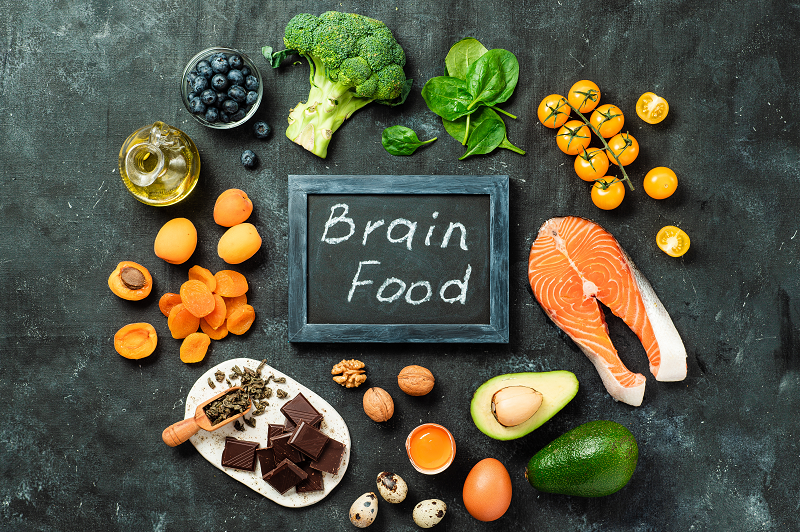Brain-Boosting Diet: 11 Foods to Improve Memory

May 01, 2023
The food that you eat can do much more than satisfy hunger. If you want to improve memory, eat things that are good for your brain.
“Think of food as the fuel that helps your brain and body run,” registered dietitian Susan Kraus says. “If you select healthy choices, you’ll help your brain be at its best.”
A variety of foods contain brain-healthy nutrients. Some of the best choices are high in vitamins, antioxidants and healthy fats.
Best Foods to Eat for a Memory Boost
To help retain or improve your memory, add these staples to your diet:
- Berries, which are rich in antioxidants, including flavonoids, the pigments that give berries color. These colorful substances may help protect the brain from age-related memory loss.
- Enjoy blueberries, blackberries, raspberries and strawberries whenever they’re available.
- Enjoy blueberries, blackberries, raspberries and strawberries whenever they’re available.
- Fatty fish, which are rich in omega-3 fatty acids. Research has shown that they increase blood flow to the brain, improving cognition.
- Eat salmon, tuna, mackerel and sardines once or twice a week.
- Eat salmon, tuna, mackerel and sardines once or twice a week.
- Whole grains, which contain complex carbohydrates, unlike white bread and white flour. Complex carbohydrates release glucose more slowly, supplying your brain with a steady energy source. “Fiber also keeps our digestive tract healthy and a balanced environment for managing the gut microbiome,” adds Susan. “This impacts our immunity, overall health and brain health.”
- Have quinoa, brown rice, buckwheat, oatmeal and other choices.
- Have quinoa, brown rice, buckwheat, oatmeal and other choices.
- Eggs, which contain B vitamins and the nutrient choline. B vitamins may ward off cognitive impairment, and choline is linked to memory improvement.
- Eating two or more eggs per week may have positive effects on memory.
- Eating two or more eggs per week may have positive effects on memory.
- Avocados, which contain healthy monounsaturated fats. These fats help reduce the risk of hypertension, which is associated with cognitive decline. “They are also great sources of potassium, fiber and carotenoids,” says Susan. “One in particular is lutein, which is a compound that crosses the blood brain barrier and can possibly help improve cognition.”
- Because avocado is high in fat, eat it in place of other dietary fats.
- Because avocado is high in fat, eat it in place of other dietary fats.
- Nuts, which contain healthy fats, including omega-3 fatty acids. Nut consumption has been associated with healthy brain function in older adults.
- Walnuts are particularly high in omega-3s, but all nuts are brain-healthy.
- Walnuts are particularly high in omega-3s, but all nuts are brain-healthy.
- Caffeinated beverages, which help you stay alert and focused. Some research suggests that caffeine consumption may help the brain process more information.
- Opt for coffee or tea, but skip store-bought drinks with added sugar.
- Opt for coffee or tea, but skip store-bought drinks with added sugar.
- Seeds, which contain omega-3s and vitamin E, an antioxidant that’s brain-healthy. Some seeds contain tyrosine, an antioxidant that has been linked with mental sharpness.
- Have vitamin E-rich sunflower seeds or sesame seeds, which are rich in tyrosine.
- Have vitamin E-rich sunflower seeds or sesame seeds, which are rich in tyrosine.
- Leafy green vegetables, which are rich in antioxidants that help fight cognitive decline. These salad staples contain vitamin E, folate and vitamin K, which promotes memory.
- Have spinach, arugula, kale and other leafy greens daily.
- Have spinach, arugula, kale and other leafy greens daily.
- Dark chocolate, which contains much more cacao than milk chocolate. Cacao, or cocoa, is rich in antioxidants that stimulate blood flow in the brain.
- Shop for dark chocolate that contains at least 70% cacao.
- Shop for dark chocolate that contains at least 70% cacao.
- Olive oil, which contains healthy monounsaturated fat and antioxidants. Research has shown that olive oil helps to reduce brain inflammation, protecting memory. “Some studies have also found that olive oil contains a polyphenol called oleuropein aglycone, which might help reduce risk of dementia or Alzheimer’s,” adds Susan.
- Choose extra virgin olive oil over other varieties; it has the most benefits.
The Best Diet to Follow to Improve Memory
It’s possible to eat everything on our list as part of the Mediterranean diet. The diet has been linked to a reduced risk of dementia.
The Mediterranean diet is high in fruits, vegetables, nuts, seeds, beans and whole grains. It also includes fish rich in omega-3s and brain-healthy olive oil.
You can easily customize the diet to suit your tastes while still eating healthily.
“Many cuisines – Greek, Italian, Spanish, Moroccan – adhere to the Mediterranean diet,” Susan says. “You can adapt other cuisines to the diet, including Japanese, Chinese, Indian and more.”
Foods to Cut Down on For Better Brain Health
Ongoing research, particularly within the Mediterranean-DASH Intervention for Neurodegenerative Delay (MIND) study, has looked at how diet affects cognitive function. The MIND diet has found that certain foods should be limited, including:
- No more than 1 tablespoon per day of butter or margarine
- Use olive oil as an alternative
- Cheese, fast food and fried food should be limited to no more than one time per week
- No more than three services per week of red meat, like beef, pork and lamb
- Processed treats like candies, cakes and snack foods should not be consumed more than four times per week
“These foods mentioned have been found to be pro-inflammatory, so while it’s important to note what we should aim to eat, we also need to pay attention to what should be avoided,” concludes Susan.
Next Steps & Resources:
- Meet our source: Susan Kraus, M.S.R.D., Registered Dietitian
- To make an appointment with a doctor near you, call 800-822-8905 or visit our website.
The material provided through HealthU is intended to be used as general information only and should not replace the advice of your physician. Always consult your physician for individual care.






